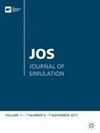A hybrid simulation approach for planning health and social care services
IF 1.7
4区 工程技术
Q4 COMPUTER SCIENCE, INTERDISCIPLINARY APPLICATIONS
引用次数: 2
Abstract
ABSTRACT Discrete-event simulation (DES) has been recognised for many years as a powerful tool to support the commissioning and resourcing of health and social care services, due to its ability to capture real-world variability. However, the complex interactions between two distinct but clearly related processes, disease progression and care provision, can lead to such models being cumbersome and lacking in transparency. Representing disease progression as a series of queues and activities is not always intuitive to a non-modeller. This paper presents a novel hybrid simulation approach in which health status is modelled using statecharts, thus combining DES with agent-based simulation. This hybrid approach allows disease progression to be modelled in a more natural way, keeping the overall model structure relatively simple. The approach is illustrated by a case study that evaluates the impact of telecare services for supporting people with dementia.一种用于规划卫生和社会护理服务的混合模拟方法
离散事件模拟(DES)多年来一直被认为是支持卫生和社会保健服务的调试和资源配置的强大工具,因为它能够捕捉现实世界的可变性。然而,两个截然不同但明显相关的过程(疾病进展和护理提供)之间复杂的相互作用可能导致这种模型繁琐且缺乏透明度。对于非建模者来说,将疾病进展表示为一系列队列和活动并不总是直观的。本文提出了一种新的混合仿真方法,利用状态图对健康状态进行建模,从而将DES与基于智能体的仿真相结合。这种混合方法允许以更自然的方式对疾病进展进行建模,使整体模型结构相对简单。一项评估远程医疗服务对支持痴呆症患者影响的案例研究说明了这种方法。
本文章由计算机程序翻译,如有差异,请以英文原文为准。
求助全文
约1分钟内获得全文
求助全文
来源期刊

Journal of Simulation
COMPUTER SCIENCE, INTERDISCIPLINARY APPLICATIONS-OPERATIONS RESEARCH & MANAGEMENT SCIENCE
CiteScore
5.70
自引率
16.00%
发文量
42
期刊介绍:
Journal of Simulation (JOS) aims to publish both articles and technical notes from researchers and practitioners active in the field of simulation. In JOS, the field of simulation includes the techniques, tools, methods and technologies of the application and the use of discrete-event simulation, agent-based modelling and system dynamics.
 求助内容:
求助内容: 应助结果提醒方式:
应助结果提醒方式:


